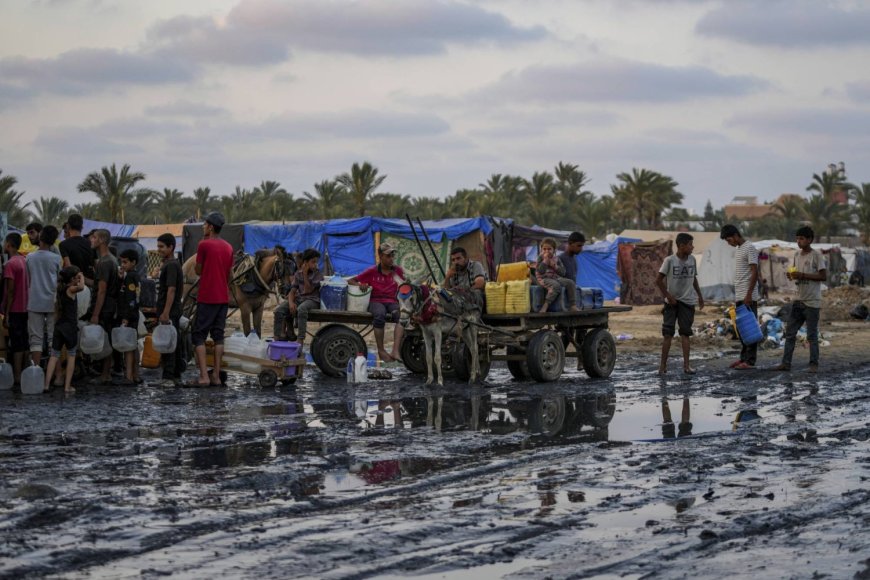Humanitarian Crisis Deepens in Gaza as War Devastates Infrastructure
Amidst scorching summer temperatures, Palestinians in Gaza face dire living conditions exacerbated by widespread sewage and garbage accumulation in crowded tent camps for displaced families. The ongoing conflict between Israel and Hamas, now in its eighth month, has severely crippled Gaza's infrastructure, leaving hundreds of thousands without adequate shelter, food, or medical care.

Amidst scorching summer temperatures, Palestinians in Gaza face dire living conditions exacerbated by widespread sewage and garbage accumulation in crowded tent camps for displaced families. The ongoing conflict between Israel and Hamas, now in its eighth month, has severely crippled Gaza's infrastructure, leaving hundreds of thousands without adequate shelter, food, or medical care.
Children wade through sewage-contaminated water in sandals, while families endure the stench of uncollected garbage piling up around them. For many, these hardships are becoming synonymous with the daily realities of war, alongside the constant threat of hunger and the sound of airstrikes.
The United Nations and aid groups report that nearly 70% of Gaza's water and sanitation facilities have been destroyed or damaged, including all five wastewater treatment plants and essential desalination facilities. This devastation has led to a severe shortage of clean water and proper sewage management, contributing to escalating health risks among the population.
"Hepatitis A cases are rising, and there are concerns about a potential cholera outbreak as temperatures rise," warned humanitarian agencies operating in Gaza. Without immediate improvements to sanitation and access to clean water, the situation could worsen significantly.
Efforts to mitigate the crisis are underway, with international organizations rushing to build latrines, repair water infrastructure, and restore essential services. However, logistical challenges and ongoing hostilities continue to impede progress. COGAT, the Israeli military body overseeing humanitarian aid efforts, acknowledges the need to improve hygiene conditions but stresses the complexities of delivering aid amid conflict.
Despite some efforts to repair and maintain desalination plants and sewage pumps, fuel shortages and damaged equipment remain significant obstacles. Many Palestinians are forced to rely on unreliable water sources, often contaminated and causing illnesses like diarrhea and gastroenteritis.
The humanitarian fallout extends beyond health concerns. Anwar al-Hurkali, a resident of a tent camp in Deir al-Balah, described the emotional toll on families living in constant fear of disease and unsanitary conditions. "We cannot stand the smell of sewage. It is killing us," he lamented.
In addition to health risks, the environmental impact of Gaza's deteriorating infrastructure is a growing concern. Untreated sewage is seeping into the ground and being pumped into the Mediterranean Sea, posing ecological threats that could extend beyond Gaza's borders.
International calls for a ceasefire and renewed diplomatic efforts to resolve the Israeli-Palestinian conflict have intensified amidst the worsening humanitarian crisis. Leaders and humanitarian organizations urge all parties to prioritize civilian protection and humanitarian access in Gaza, underscoring the urgency of a sustainable peace agreement.
As the crisis deepens, ordinary Palestinians like Adel Dalloul, who described living amidst piles of garbage and insect infestations, express frustration and despair over their uncertain future. "We are supposed to start our lives," he said, "but now I just live in front of the garbage."
The situation in Gaza remains fluid and complex, with humanitarian aid efforts struggling to meet the overwhelming needs of the population amidst ongoing violence and infrastructure devastation. Diplomatic efforts continue as the international community seeks lasting solutions to alleviate the suffering of civilians caught in the crossfire.













































